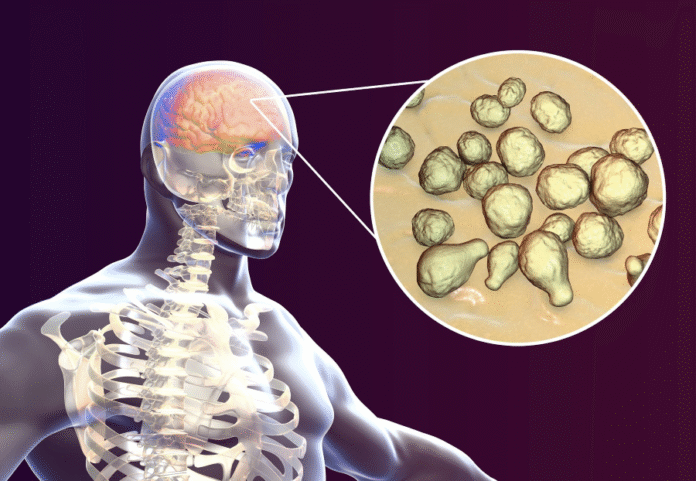Illustrative Image: Recent ART Initiation Linked to Higher Mortality in HIV-Associated Cryptococcal Meningitis: Insights From African Clinical Trials
Image Source & Credit: Infectious Disease Advisor
Ownership and Usage Policy
A recent study by Moyo et al. (2025) titled “Recent Antiretroviral Therapy Initiation Is Associated With Increased Mortality Risk in HIV–associated Cryptococcal Meningitis: An Analysis of Clinical Trial Data From Africa” published in Clinical Infectious Diseases, reveal that patients who had started ART within 14 days before their meningitis diagnosis faced a markedly higher two-week mortality rate (20.8%) compared to those on ART for longer durations or those not yet on therapy.
“
Starting ART within 14 days before cryptococcal meningitis diagnosis increases mortality, but temporary ART interruption significantly improves survival outcomes.
– Moyo et al. 2025
The study explores the critical relationship between HIV treatment and cryptococcal meningitis, a life-threatening fungal infection. Drawing on data from over 1,400 participants in two major African clinical trials—the AMBITION trial (2018–2021) and the ACTA trial (2013–2016)—the research investigates how the timing of antiretroviral therapy (ART) initiation influences mortality outcomes. Findings reveal that patients who had started ART within 14 days before their meningitis diagnosis faced a markedly higher two-week mortality rate (20.8%) compared to those on ART for longer durations or those not yet on therapy. Notably, interrupting ART in these recent initiators reduced mortality risk (14% vs. 35% when ART was continued), underscoring the dangers of immune reconstitution inflammatory syndrome (IRIS), which can worsen outcomes.
In contrast, individuals on ART for two weeks to six months generally showed lower fungal burdens and improved immune recovery, as reflected in higher CD4 counts. However, those on ART for more than six months but still presenting with meningitis often struggled with poor adherence or drug resistance, leading to outcomes similar to patients who had never initiated ART. The study challenges the conventional assumption that all ART-experienced patients should remain on therapy following a meningitis diagnosis. Instead, it advocates for a tailored approach to ART management, considering both the timing of ART initiation and the patient’s clinical status. Ultimately, the research highlights the complexity of managing advanced HIV in resource-limited settings and emphasizes the need for improved screening strategies and stronger adherence support to prevent late-stage complications such as cryptococcal meningitis.
How the Study was Conducted
The study employed a retrospective analysis of data from two major multicenter clinical trials conducted across sub-Saharan Africa: the ACTA trial (2013–2016) and the AMBITION trial (2018–2021). A total of 1,474 adults with HIV-associated cryptococcal meningitis were included, with participants recruited from six countries—Botswana, Malawi, South Africa, Uganda, Zambia, and Zimbabwe.
Participants were categorized according to their antiretroviral therapy (ART) status at the time of diagnosis: ART-naive, recently initiated ART (within 14 days), intermediate ART duration (15 days to 6 months), or long-term ART exposure (>6 months). Mortality outcomes were assessed at two and ten weeks post-diagnosis. Additional clinical data collected included CD4 cell counts, baseline fungal burden (measured through cerebrospinal fluid cultures), and, where available, ART adherence and resistance profiles. Analytically, researchers applied multivariable logistic regression to control for confounding variables such as age, sex, baseline fungal burden, and mental status. The primary comparison focused on outcomes for patients who had recently initiated ART relative to those with longer ART exposure or no prior ART use. They also investigated the effects of interrupting ART after diagnosis within the recently initiated group. Both trials received ethical approval from relevant institutional review boards, and informed consent was obtained from all participants or their legal representatives.
What the Authors Found
The authors found that recent ART initiation (≤14 days before cryptococcal meningitis diagnosis) is associated with significantly higher early mortality, but temporarily interrupting ART in these patients can improve survival, underscoring the need for tailored ART strategies rather than a universal approach.
Why is this important
Rethinking ART Timing – While early ART is standard in HIV care, starting it within 14 days before cryptococcal meningitis diagnosis increases mortality due to IRIS.
Personalized Treatment Approaches – Temporarily interrupting ART in recently initiated patients improves survival, highlighting the need for tailored rather than uniform treatment strategies.
Adherence and Resistance Matter – Long-term ART alone does not guarantee protection; poor adherence and drug resistance remain major risks.
Global Health Impact – These findings can shape updated guidelines, strengthen HIV care in resource-limited settings, and reduce preventable deaths from cryptococcal meningitis.
What the Authors Recommended
- The author emphasises avoiding automatically continuing ART in all cases of cryptococcal meningitis. For patients who started ART within 14 days, consider temporary interruption to lower IRIS risk and improve survival.
- Use ART exposure length to inform care: recent initiators may need interruption, intermediate users often benefit from continuation, and long-term users should be assessed for adherence and resistance.
- Implement routine cryptococcal antigen screening in advanced HIV patients before ART initiation, and closely monitor fungal burden, CD4 counts, and clinical status.
- Address poor outcomes in long-term ART users through adherence support programs, resistance testing, and patient education to ensure sustained ART effectiveness.
- Revise national and global HIV treatment protocols to incorporate flexible, evidence-based ART strategies for managing opportunistic infections such as cryptococcal meningitis.
In conclusion, this study underscores the urgent need for flexible, evidence-based HIV treatment strategies that consider ART timing, adherence, and resistance, ultimately improving survival outcomes for patients with cryptococcal meningitis in resource-limited settings.
















 The African Research (AR) Index is a comprehensive scholarly directory and database focused explicitly on journal publishers that publish and disseminate African research.
The African Research (AR) Index is a comprehensive scholarly directory and database focused explicitly on journal publishers that publish and disseminate African research.

